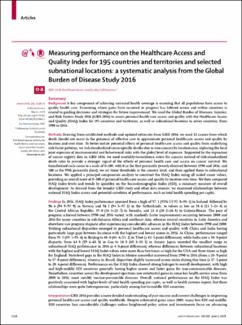Measuring performance on the Healthcare Access and Quality Index for 195 countries and territories and selected subnational locations: a systematic analysis from the Global Burden of Disease Study 2016
Date
2018-06-02Author
Fullman, Nancy
Yearwood, Jamal
Abay, Solomon M
Abbafati, Cristiana
Abd-Allah, Foad
Abdela, Jemal
Abdelalim, Ahmed
Abebe, Zegeye
Abuka Abebo, Teshome
Aboyans, Victor
Niguse Abraha, Haftom
Abreu, Daisy MX
Abu-Raddad, Laith J
Adane, Akilew Awoke
Adedoyin, Rufus Adesoji
Adetokunboh, Olatunji
Adhikari, Tara Ballav
Afarideh, Mohsen
Afshin, Ashkan
Agarwal, Gina
Agius, Dominic
Agrawal, Anurag
Agrawal, Sutapa
Kiadaliri, Aliasghar Ahmad
Eddine Aichour, Miloud Taki
Akibu, Mohammed
Akinyemi, Rufus Olusola
Akinyemiju, Tomi F
Akseer, Nadia
Al Lami, Faris Hasan
Alahdab, Fares
Al-Aly, Ziyad
Alam, Khurshid
Alam, Tahiya
Alasfoor, Deena
Albittar, Mohammed I
Addis Alene, Kefyalew
Al-Eyadhy, Ayman
Ali, Syed Danish
Alijanzadeh, Mehran
Aljunid, Syed M
Alkerwi, Ala'a
Alla, François
Allebeck, Peter
Allen, Christine
Alomari, Mahmoud A
Al-Raddadi, Rajaa
Alsharif, Ubai
Altirkawi, Khalid A
Alvis-Guzman, Nelson
Amare, Azmeraw T
Amenu, Kebede
Ammar, Walid
Ampem Amoako, Yaw
Anber, Nahla
Andrei, Catalina Liliana
Androudi, Sofia
T Antonio, Carl Abelardo
Araújo, Valdelaine EM
Aremu, Olatunde
Ärnlöv, Johan
Artaman, Al
Aryal, Krishna Kumar
Asayesh, Hamid
Tsegay Asfaw, Ephrem
Weldegebreal Asgedom, Solomon
Asghar, Rana Jawad
Ashebir, Mengistu Mitiku
Abera Asseffa, Netsanet
Atey, Tesfay Mehari
Atre, Sachin R
Atteraya, Madhu S
Avila-Burgos, Leticia
Arthur Avokpaho, Euripide Frinel G
Awasthi, Ashish
Ayala Quintanilla, Beatriz Paulina
Alebel Ayalew, Animut
Ayele, Henok Tadesse
Ayer, Rakesh
Betrand Ayuk, Tambe
Azzopardi, Peter
Azzopardi-Muscat, Natasha
Babalola, Tesleem Kayode
Badali, Hamid
Badawi, Alaa
Banach, Maciej
Banerjee, Amitava
Banstola, Amrit
Barber, Ryan M
Barboza, Miguel A
Barker-Collo, Suzanne L
Bärnighausen, Till
Barquera, Simon
Barrero, Lope H
Bassat, Quique
Basu, Sanjay
Baune, Bernhard T
Bazargan-Hejazi, Shahrzad
Bedi, Neeraj
Beghi, Ettore
Behzadifar, Masoud
Behzadifar, Meysam
Bekele, Bayu Begashaw
Belachew, Abate Bekele
Belay, Saba Abraham
Abebe Belay, Yihalem
Bell, Michelle L
Bello, Aminu K
Bennett, Derrick A
Bennett, James R
Bensenor, Isabela M
Berhe, Derbew Fikadu
Bernabé, Eduardo
Bernstein, Robert Steven
Beuran, Mircea
Bhalla, Ashish
Bhatt, Paurvi
Bhaumik, Soumyadeep
Bhutta, Zulfiqar A
Biadgo, Belete
Bijani, Ali
Bikbov, Boris
Birungi, Charles
Biryukov, Stan
Bizuneh, Hailemichael
Bolliger, Ian W
Bolt, Kaylin
Bou-Orm, Ibrahim R
Bozorgmehr, Kayvan
Brady, Oliver Jerome
Brazinova, Alexandra
Breitborde, Nicholas JK
Brenner, Hermann
Britton, Gabrielle
Brugha, Traolach S
Butt, Zahid A
Cahuana-Hurtado, Lucero
Campos-Nonato, Ismael Ricardo
Campuzano, Julio Cesar
Car, Josip
Car, Mate
Cárdenas, Rosario
Carrero, Juan Jesus
Carvalho, Felix
Castañeda-Orjuela, Carlos A
Castillo Rivas, Jacqueline
Catalá-López, Ferrán
Cercy, Kelly
Chalek, Julian
Chang, Hsing-Yi
Metadata
Show full item recordAbstract
Background A key component of achieving universal health coverage is ensuring that all populations have access to quality health care. Examining where gains have occurred or progress has faltered across and within countries is crucial to guiding decisions and strategies for future improvement. We used the Global Burden of Diseases, Injuries, and Risk Factors Study 2016 (GBD 2016) to assess personal health-care access and quality with the Healthcare Access and Quality (HAQ) Index for 195 countries and territories, as well as subnational locations in seven countries, from 1990 to 2016.Methods Drawing from established methods and updated estimates from GBD 2016, we used 32 causes from which death should not occur in the presence of effective care to approximate personal health-care access and quality by location and over time. To better isolate potential effects of personal health-care access and quality from underlying risk factor patterns, we risk-standardised cause-specific deaths due to non-cancers by location-year, replacing the local joint exposure of environmental and behavioural risks with the global level of exposure. Supported by the expansion of cancer registry data in GBD 2016, we used mortality-to-incidence ratios for cancers instead of risk-standardised death rates to provide a stronger signal of the effects of personal health care and access on cancer survival. We transformed each cause to a scale of 0–100, with 0 as the first percentile (worst) observed between 1990 and 2016, and 100 as the 99th percentile (best); we set these thresholds at the country level, and then applied them to subnational locations. We applied a principal components analysis to construct the HAQ Index using all scaled cause values, providing an overall score of 0–100 of personal health-care access and quality by location over time. We then compared HAQ Index levels and trends by quintiles on the Socio-demographic Index (SDI), a summary measure of overall development. As derived from the broader GBD study and other data sources, we examined relationships between national HAQ Index scores and potential correlates of performance, such as total health spending per capita.

